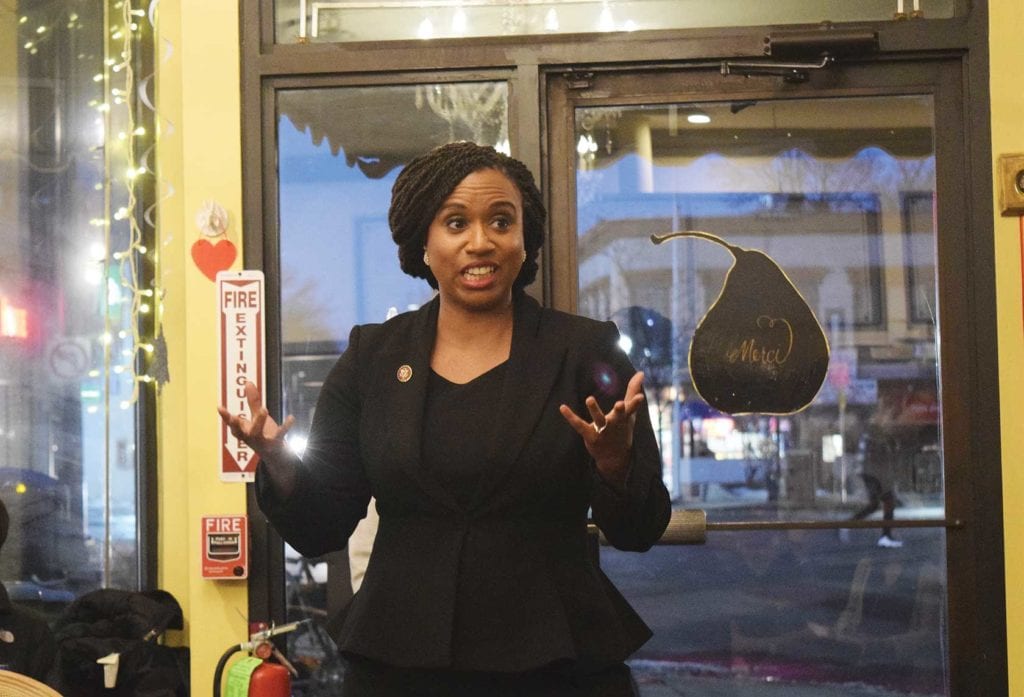Pressley discusses bike safety in Dorchester
Pressley, activists call for equity in Boston’s bicycle infrastructure improvements

Bike advocates and community organizers met at Home.Stead Bakery & Cafe last Thursday to discuss bicycle safety infrastructure as part of U.S. Rep. Ayanna Pressley’s Equity Agenda series.
The meeting at the Fields Corner bakery occurred just a week after Paula Sharaga, a 69-year-old children’s librarian, was killed on her bike after a collision with a truck in the Fenway area.
“I want you all to be partners,” said Pressley, who represents the 7th Congressional District of Massachusetts. “I’m not recusing my opportunity to lean in on state and municipal level matters, but what are you hoping I lean on at the federal level?”
Pressley said she is currently focused on pushing three major issues at the federal level, including the Vision Zero Act, introduced by U.S. Rep. Earl Blumenauer of Oregon in 2017. This bill enforces the idea that all traffic fatalities, including those involving bicyclists, are preventable and would offer grants to local governments for safety innovations and inter-agency cooperation.
Another federal priority, Pressley said, is bringing back the bicycle commuter tax benefit, which was scrapped with the recent GOP tax cut. The bike commuter tax allows employers to incentivize their employees to commute to work on bike by offering tax benefits. “You deserve that benefit because you are expending calories, not carbon,” she said.
And Pressley’s third major priority is redefining transit programming to include bike sharing, so that bike sharing programs can be eligible for federal funding. “We want some of those dollars. We should not be investing any more money in the construction of highways,” said Pressley.
Pointing out the danger and death rate of cyclists getting hit by trucks on the road, Becca Wolfson, executive director of the Boston Cyclists Union, said, “We hope you can take what you did in Boston in creating the first truck safety ordinance and take it to federal level.”
According to Wolfson, the union has been in touch with those in the truck industry who say they cannot rely on local policy because it might “disadvantage Massachusetts trucking companies” and instead are looking for federal policy to follow.
Several of the meeting’s attendees pointed out specific locations that are particularly dangerous and need more safety measures, such as protected bike lanes. The locations included an intersection on Broadway Street in Everett near the Encore Casino, the O’Brien Highway and Museum Way intersection, Morton Street in Dorchester and parts of Dorchester Avenue.
Angela Johnson-Rodriguez, Vice President of the Boston Cyclists Union board, said a big part of the pushback on bike infrastructure is due to Boston’s overreliance on cars. “The pushback is always, ‘Where are we going to park?’ and ‘How are we going to continue driving?’” Rodriguez said. “There’s a reluctance to reduce the amount of cars on the road.”
Noah de Amor, founder of Bowdoin Bike School, said transportation planners should be taking more initiative to have basic, common-sense infrastructure already in place for bicyclists. “Average working class people don’t necessarily have the time or energy to fight for every bike policy. We should automatically be following best practices,” he said.
One person brought up the “reactive mindset” of policymakers who successfully get projects done only when a tragedy has taken place. Adding to that, Pressley said, “Why do we have to weaponize our lived experiences to be heard?”
As certain areas in the city remain without dedicated bike lanes, biking continues to be a hazardous choice for some. Pressley said, “You are entitled to be safe in your commute, and to not have to risk your life to get to work and school.”






